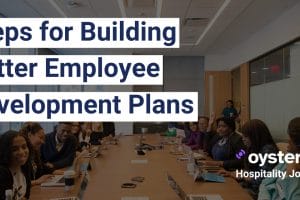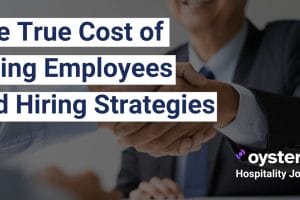As a current or aspiring bar or restaurant owner, enhancing your establishment’s operations is crucial for success. Hiring a consultant can provide valuable insights, but it’s essential to choose the right type of expert.
While the roles of a Restaurant Consultant and a Bar Consultant may appear similar, they have distinct areas of focus. This article explores the differences between the two to help you determine which one aligns best with your needs.
Definition of a Bar Consultant vs. a Restaurant Consultant
A recent study shows that the U.S. hospitality industry market size in 2025 is estimated at $235.96 billion.

[Source: Mordor Intelligence]
Bars and restaurants are integral components of this sector. If your establishment is striving to capture a share of this revenue, enlisting the right consultant is vital. Understanding the distinct roles of restaurant and bar consultants is the first step.
What’s a Restaurant Consultant?
A Restaurant Consultant is a seasoned professional with extensive experience in the restaurant and hospitality industry. They collaborate with various dining establishments, from casual eateries to fine dining venues, to analyze operations and identify areas for improvement. Their goal is to optimize processes, attract new patrons and enhance the restaurant’s financial health.
What’s a Bar Consultant?
A Bar Consultant is an experienced hospitality professional with the necessary knowledge to improve a bar’s services and operations. Unlike Restaurant Consultants who are experts in different establishment types, Bar Consultants focus specifically on drinking establishments. They can help clients with bar inventory management, updating the drinks menu and training the restaurant’s Bartenders and other staff in mixology.
Roles & Responsibilities of Bar vs. Restaurant Consultants
Even though there can be an overlap between the duties of a Bar Consultant and a Restaurant Consultant, they are both specialists in their respective areas. As such, their primary responsibilities slightly differ.
Primary Responsibilities of a Restaurant Consultant
The key responsibilities of a Restaurant Consultant often include:
- Analyzing restaurant processes (such as for inventory and sales) and identifying areas for improvement
- Providing recommendations to update current menu items or create new ones
- Training staff members like Servers or Waiters and Waitresses
- Creating and executing appropriate marketing efforts
- Tracking the success of implemented changes
Primary Responsibilities of a Bar Consultant
Some of the main Bar Consultant responsibilities include:
- Developing a beverage menu
- Providing mixology training
- Improving the bar’s inventory management
- Optimizing the bar layout
- Establishing pricing strategies for every drink
- Developing customer engagement strategies to create a pleasant bar atmosphere
Top Skills Required for Each Role
Becoming a successful Bar or Restaurant Consultant typically requires years of employment in the hospitality sector.
After all, the skills needed to improve an establishment’s operations come from extensive hands-on experience.
Skills for Restaurant Consultants
Here are some of the top skills every Restaurant Consultant should have. A successful Restaurant Consultant has a deep understanding of restaurant operations and their best practices. They are well-equipped to handle everything from managing inventory to ensuring front-of-house employees provide exceptional customer service. By leveraging their expertise, you can streamline operations, enhance customer satisfaction and achieve your business goals.
Menu development
This is one of the more important elements of a Restaurant Consultant’s job description. Menu development refers to the process of curating the restaurants’ food and beverage offerings.
While Restaurant Consultants don’t always need a culinary background, they should be able to assess the menu and suggest improvements or updates that cater to the restaurant’s target audience. In doing so, they also help restaurants establish their brand identity and potentially invite new restaurant patrons.
Cost control
Restaurant Consultants can also help establishments optimize their costs. This involves minimizing costs without compromising on food and beverage or service quality. While cost control can refer to the menu, inventory or staffing costs, it can also encompass negotiation with suppliers.
Staff training
Experienced Restaurant Consultants can educate and train staff to help them improve their customer service skills. It is the consultant’s job to effectively communicate the expectations for each staff member and to show them how to fulfill their obligations. In turn, the staff will have improved customer service skills which will also help the restaurant’s reputation among customers.
Marketing
Restaurant Consultants can also help establishments with their marketing efforts. From traditional to digital marketing strategies, consultants are usually equipped with the skills to market an establishment in a way that increases its visibility and attracts new guests.
Skills for Bar Consultants
Below are the top skills one needs in order to be a successful Bar Consultant.
Mixology knowledge
Bar Consultants must be experts in all things mixology. This includes knowing about the history of various cocktails, classic techniques, common trends and innovative approaches to creating new cocktails.
Bar layout
Efficient bar operations hinge on a well-designed layout that maximizes workflow and minimizes bottlenecks. A Bar Consultant must be adept at analyzing and redesigning the physical setup of a bar to improve the speed and efficiency of bar service.
Inventory and cost management
Successful Bar Consultants can develop and implement inventory management strategies that improve the bar’s bottom line. At the same time, they should know how to set accurate pricing strategies that balance profitability with customer satisfaction.
Creative beverage development
Creativity in developing new and exciting beverages is a hallmark of a successful Bar Consultant. This skill involves staying ahead of trends and understanding customer preferences to craft unique signature cocktails that differentiate the bar from competitors.
Staff training skills
A Bar Consultant also needs to be an excellent teacher. This involves having the ability to teach Bartenders about advanced mixology techniques, customer service excellence and efficient workflow practices. In doing so, the Bar Consultant will not only improve the bar’s drinks offerings, but also create a knowledgeable staff.
Trends Shaping Bar and Restaurant Consulting in 2025
The hospitality industry is constantly evolving and bar and restaurant consultants are at the forefront of this change. As we step into 2025, several exciting trends are shaping how consultants approach their work.Sustainability is no longer just a buzzword—it’s a priority.
Consultants are helping businesses reduce food waste, source locally and even design spaces using eco-friendly materials. Meanwhile, technology is revolutionizing the industry. From AI-powered menu recommendations to mobile app integrations, embracing tech is essential for staying competitive.
54% of restaurant leaders plan to increase their engagement with AI projects over the next year.
Another growing trend is the rise of hybrid business models. Restaurants are adding experiential elements like live music or themed dining nights to attract more customers. Personalization is also becoming a key focus. Whether it’s crafting customer loyalty programs or creating niche menus, consultants are ensuring that every guest feels like the business was designed just for them.
Bar vs. Restaurant Consultant: Conclusion
While the roles of a Restaurant and Bar Consultant have some overlaps, the distinction between them is quite apparent.
To summarize: Restaurant Consultants help dining establishments improve their overall processes from inventory to staff education and marketing. Meanwhile, Bar Consultants are more concerned with operations of a bar or other drinking establishment, including the drinks menu and bar layout.
/fa
Bar vs Restaurant Consultant FAQs
While Restaurant Consultants have a broad understanding of hospitality operations, bar consultants possess specialized expertise in bar-specific areas, making them more suited for bar-related improvements.
Assess your establishment’s specific needs. If you require assistance with overall restaurant operations, a restaurant consultant is appropriate. For bar-specific improvements, a bar consultant would be more beneficial.
Hiring a consultant brings specialized expertise to your establishment, offering objective insights and tailored strategies to improve operations, enhance customer experience and increase profitability.
Yes, AI-powered tools can provide tailored training modules for staff, covering customer service, inventory management, and advanced skills like mixology or menu optimization.
Sustainability is key, with consultants focusing on reducing food waste, sourcing local ingredients, and using eco-friendly materials in design, aligning with modern consumer values.

Written by Jericka Orellano
Jericka is a published author who has had a decade of experience in publishing, editorial work, localization and media. Having spent eight years as a professional trainer and supervisor for other writers and editors, she excels in research, copyediting, proofreading and quality assurance. She now works with OysterLink as a content specialist.

Edited by Marcy Miniano
Marcy is an editor and writer with a background in public relations and brand marketing. Throughout her nearly decade-long career, she has honed her skills in crafting content and helping build brands across various industries — including restaurant and hospitality, travel, tech, fashion and entertainment.




